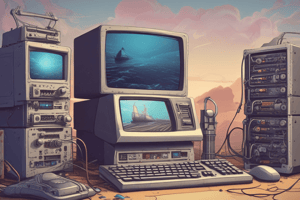Podcast
Questions and Answers
What is the primary function of an operating system?
What is the primary function of an operating system?
- Creating computer programs
- Regulating the usage of shared resources (correct)
- Developing programming languages
- Managing hardware design
Which of the following is NOT an example of a mobile operating system?
Which of the following is NOT an example of a mobile operating system?
- Android
- Windows
- Linux (correct)
- iOS
What do TCP/IP protocols ensure in networking?
What do TCP/IP protocols ensure in networking?
- Encryption of data
- Reliable delivery of information (correct)
- Physical connection between devices
- Dynamic allocation of IP addresses
Which programming language is known for its high performance and memory safety characteristics?
Which programming language is known for its high performance and memory safety characteristics?
What core concept deals with the physical components of a computer system?
What core concept deals with the physical components of a computer system?
How does choosing the right programming language impact software projects?
How does choosing the right programming language impact software projects?
What is the heart of every computer's physical structure?
What is the heart of every computer's physical structure?
Which component of a computer is responsible for managing the computer's resources?
Which component of a computer is responsible for managing the computer's resources?
What category of software includes programs like Microsoft Office and web browsers?
What category of software includes programs like Microsoft Office and web browsers?
Which networking component allows computers to connect wirelessly to the internet?
Which networking component allows computers to connect wirelessly to the internet?
What are examples of input/output peripherals in a computer system?
What are examples of input/output peripherals in a computer system?
In a computer system, what role do programming languages play?
In a computer system, what role do programming languages play?
Flashcards are hidden until you start studying
Study Notes
Understanding Computers
Computers have become ubiquitous in our daily lives, from personal devices like smartphones to powerful servers running critical infrastructure. To understand computers better, it's essential to delve into their various components and how they interact with each other. Here, we will explore the fundamental aspects of computers, including hardware, software, operating systems, networking, and programming languages.
Hardware
At the heart of every computer is its physical structure—the hardware. This includes the central processing unit (CPU), memory modules such as random access memory (RAM) and storage devices like hard drives and solid state drives (SSDs), input/output peripherals like keyboards, mice, monitors, printers, etc., and communication interfaces such as Ethernet ports, WiFi cards, and USB ports. These elements work together seamlessly to enable basic computing tasks and more complex operations.
Software
Software refers to programs and applications designed to run on a computer's hardware. There are two primary categories of software: system software, which manages the computer’s resources; and application software, which provides specific functionality to users. System software includes the operating system (OS), device drivers, utilities, and firmware. Application software ranges from productivity suites like Microsoft Office to games, web browsers like Chrome or Firefox, media players, and many others.
Operating Systems
An OS acts as the interface between the computer's hardware and its user. It provides common services for computer programs, regulates the usage of shared resources, and manages requests for services by various programs and the computer itself. Examples of popular desktop OSes include Windows, macOS, and Linux. Mobile platforms like iOS and Android also serve as mobile operating systems optimized for handheld devices.
Networking
Networking allows multiple computers to communicate with one another over a network, whether local or wide area networks (LANs and WANs). This enables sharing data and resources among them, facilitating collaboration, file transfer, and remote access. Protocols such as TCP/IP govern communications across different types of networks, ensuring reliable delivery of information.
Programming Languages
Programming languages are used to create software. They vary widely in terms of complexity, purpose, and syntax. Some examples include C++, Python, Java, JavaScript, Ruby, Rust, Go, Scala, etc.. Each has its own strengths and weaknesses, making some better suited for certain types of projects than others. Choosing the right language can greatly affect the efficiency, maintainability, and performance of a program.
In summary, understanding computers involves grasping these core concepts: hardware, software, operating systems, networking, and programming languages. By recognizing their roles within a computer ecosystem, you can appreciate why certain choices matter when building your next digital project.
Studying That Suits You
Use AI to generate personalized quizzes and flashcards to suit your learning preferences.





